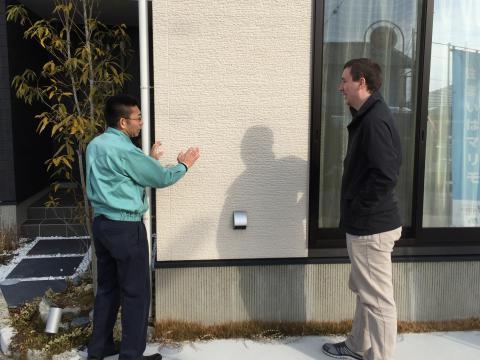
Australia’s reputation as a manufacturer of zero-emission and structurally-compliant engineered wood products that meet global certification standards was further enhanced during EWPAA presentations to Japanese government officials last month.
EWPAA CEO Dave Gover and quality systems engineer Andrew McLaughlin were in Tokyo for talks with the Ministry of Agriculture, Forestry and Fisheries, focussing on market and industry conditions in Japan and future opportunities for engineered wood products produced by EWPAA members.
The photo; EWPAA quality systems engineer Andrew McLaughlin (right) and Shinichiro Naoi of Japan-based Wood One discuss airtight building systems to manage internal air-quality, and product emissions.
Mr Gover said government building policies in Japan had a heavy emphasis on emissions-free and accredited timber in the residential and commercial sectors.
“The Japanese building industry and consumers are well aware of issues of air quality in buildings” Mr Gover said. “There are some interesting products and practices out there to improve and manage air quality and undoubtedly more to come.”
During the EWPAA visit, building systems, including techniques to manage internal air-quality and product emissions, were inspected at Wood One Pty Ltd, a major international housing materials and componentry business and parent company of EWPAA member Juken New Zealand Ltd.
Wood One has invested more than $NZ700 million in technology and resources to further develop Juken’s high-quality manufacturing base.
The EWPAA mission enabled tabling of documents with the Ministry of Economy Trade and Industry (METI) prior to renewal of the association’s Japanese Industrial System (JIS) accreditation, followed by meetings with the National Institute of Technology and Evaluation which will conduct the accreditation audit on METI’s behalf. Fundamental to JIS accreditation is controlling product emissions.
The busy round of meetings included discussions with the Food and Agriculture Materials Inspection Centre (FAMIC) to discuss interpretation of the JAS LVL standard.
Mr Gover said the respected Japanese Agricultural Standard (JAS) is a requirement for plywood and LVL products going into the Japanese market. Clear product labelling and registered quality certification marks is an important factor.


